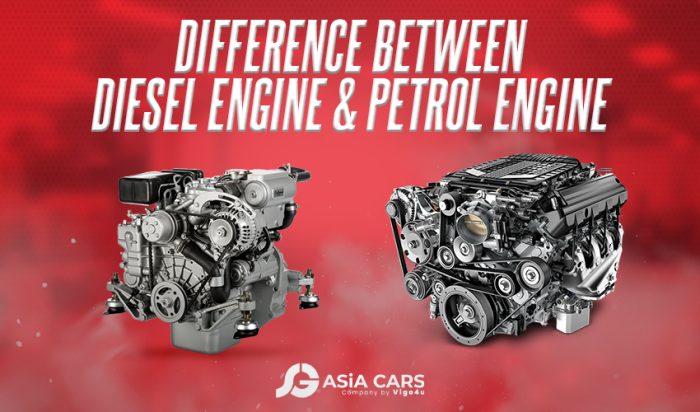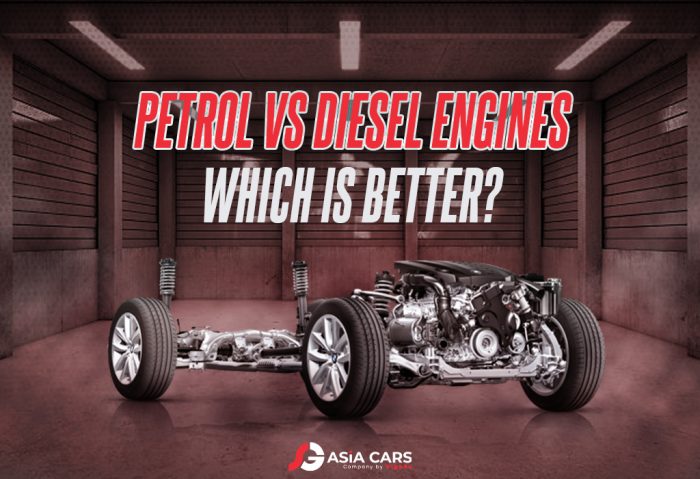Petrol Vs Diesel Engine – Which Is Better?
Deciding between a petrol vs diesel engine for your car is a significant challenge for many buyers. Whether you’re in the market for a brand-new vehicle or a second-hand option, the efficiency question between petrol vs diesel engines likely looms large in your decision-making process. Fear not; in this informative blog, we delve into the nuances of petrol vs diesel engines, outlining their advantages and disadvantages to clear up any confusion you might have.
Difference Between Diesel Engine & Petrol Engine

The difference between a diesel and a petrol engine is an ignition point. In a diesel engine, ignition is caused by the heat of the compressed air, which ignites the mixture of diesel fuel. Therefore, in diesel engines spark plugs only require glow plugs to heat the combustion chamber.
The petrol engine uses the Otto cycle, while a diesel engine uses the diesel cycle. Diesel engines and petrol engines are different on the bases of power output. Petrol engines have a lower compression ratio than diesel engines, which results in more torque. This also helps to understand that diesel engines are more powerful than petrol engines.
Pros & Cons Of Diesel Engine
Pros:
- Diesel vehicles are very cost-effective than petrol. They generate more power due to their higher compression rating than a petrol engine, using up to 20% less fuel.
- Modern diesel engines are environmentally friendly as compared to petrol engines. They emit less CO2, which is environmentally friendly.
- The chance of the fuel igniting when an accident occurs is lower with diesel engines than with petrol engines.
- Diesel produces considerably more torque (pulling power), which makes them ideal for carrying.
- Diesel engines are generally more rugged than petrol engines, as they have higher compression ratios.
- Diesel vehicles perform great on the highway, providing strong overtaking power and often doing so without changing gears.
Cons:
- Diesel cars have higher road tax
- When you start your market research, you find diesel vehicles are generally more expensive than regular vehicles, which makes them potential buyers harder to purchase.
- Although diesel engines offer the benefit of higher durability, you’ll pay more in the context of repairing when they create issues.
- During frigid weather, driving a diesel car can be challenging when temperatures drop below freezing. It becomes highly problematic to start the engine.
- Diesel engines emit higher levels of nitrogen oxide, which are noisier than petrol cars.
Pros & Cons Of Petrol Engine
Pros
- Petrol cars tend to be cheaper than similar diesel models
- Petrol engines can be slightly quieter.
- The maintenance cost of petrol vehicles is usually lower than that of diesel cars.
- Petrol vehicles deal better in frigid environments rather than diesel engines.
Cons
- Petrol engines are less efficient than diesel engines because they use more fuel.
- The lifespan of petrol is shorter than a diesel engine
- The petrol engine is not effective for larger vehicles such as SUVs, pickups, and trucks
Car drivers love the flexibility and pulling power they are expected in their dream car. Diesel is more economical, and you’ll experience more miles than petrol. No one wants to pay extra costs for tech and maintenance that a diesel engine needs to be clean and efficient.
Choosing a petrol or diesel engine is daunting for car buyers. If you drive many miles, a diesel car would always be your best choice. However, a petrol vehicle would be the better option if you don’t drive for long. Whether you prefer to buy new or second-hand Toyota diesel or petrol cars, you can contact SG Asia a leading dealer for new and 2nd hand cars in Bangkok at compelling prices.

